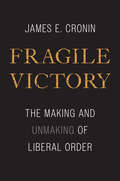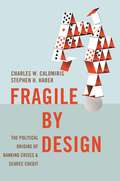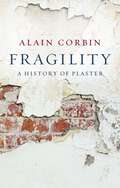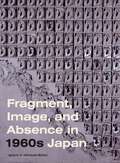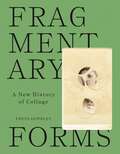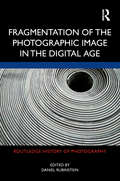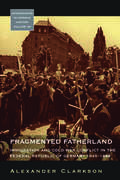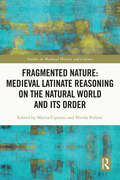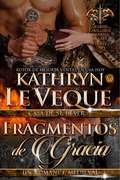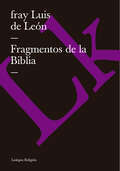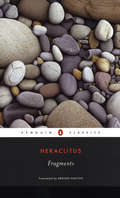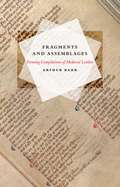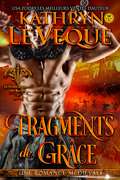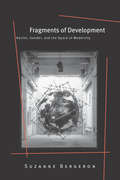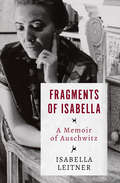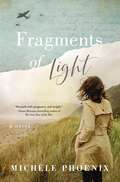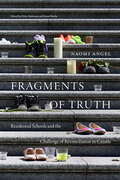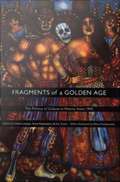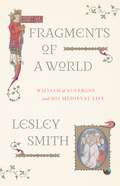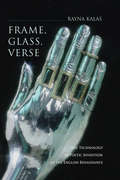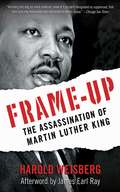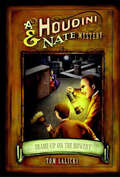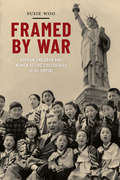- Table View
- List View
Fragile Victory: The Making and Unmaking of Liberal Order
by James E. CroninHow the history of liberal order and democratic politics since the 1930s explains ongoing threats to democracy and international order The liberal democratic order that seemed so stable in North America and Western Europe has become precarious. James E. Cronin argues that liberalism has never been secure and that since the 1930s the international order has had to be crafted, redeployed, and extended in response to both victories and setbacks. Beginning with the German and Japanese efforts in the 1930s to establish a system based on empire, race, economic protectionism, and militant nationalism, Cronin shows how the postwar system, established out of a revulsion at the ideas of fascism, repeatedly reinvented itself in the face of the Cold War, anticolonial insurgencies, the economic and political crises of the 1970s, the collapse of communism, the rise of globalization, and the financial crisis of 2008. Cronin emphasizes the links between internal and external politics in sustaining liberal order internationally and the domestic origins and correlates of present difficulties. Fragile Victory provides the context necessary to understand such diverse challenges as the triumph of Brexit, the election of Trump, the rise of populism, and the Russian invasion of Ukraine.
Fragile by Design: The Political Origins of Banking Crises and Scarce Credit (The Princeton Economic History of the Western World #50)
by Charles W. Calomiris Stephen HaberWhy stable banking systems are so rareWhy are banking systems unstable in so many countries—but not in others? The United States has had twelve systemic banking crises since 1840, while Canada has had none. The banking systems of Mexico and Brazil have not only been crisis prone but have provided miniscule amounts of credit to business enterprises and households.Analyzing the political and banking history of the United Kingdom, the United States, Canada, Mexico, and Brazil through several centuries, Fragile by Design demonstrates that chronic banking crises and scarce credit are not accidents. Calomiris and Haber combine political history and economics to examine how coalitions of politicians, bankers, and other interest groups form, why they endure, and how they generate policies that determine who gets to be a banker, who has access to credit, and who pays for bank bailouts and rescues.Fragile by Design is a revealing exploration of the ways that politics inevitably intrudes into bank regulation.
Fragility: A History of Plaster
by Alain CorbinThe distant past is commonly characterized in terms of dominant materials of the time – the Stone Age, the Bronze Age, the Iron Age, etc. Since the dawn of writing, however, characterizing eras in terms of materials has fallen by the wayside, and yet materials have continued to exert a powerful influence on our collective imagination.Viewed from this perspective, France in the period from 1815 to 1855 could be seen as the half-century of plaster. After the French Revolution, plaster was used for a great variety of things: building, moulding, sculpting, decorating. Cheap and easy to use, plaster was everywhere, from Napoleon’s death mask to household ornaments, from walls to elaborate mouldings. Plaster was king – but a fragile king that easily crumbled and fell apart. The age of plaster was also the reign of the ephemeral and the transient, the vulgar and the eclectic, and the men and women of the time struggled to maintain stability and continuity with the past. In the space of a few decades, no fewer than seven political regimes succeeded one another. Plaster – symbol of the ephemeral, the flaking and the vulgar – is the material which defines the first half of the nineteenth century.Written with his characteristic brilliance and eye for unconventional topics, Alain Corbin’s highly original exploration of the role of plaster in history will be of interest to a wide readership.
Fragment, Image, and Absence in 1960s Japan (Refiguring Modernism)
by Ignacio A. Adriasola MuñozThis groundbreaking book examines how the notion of “the object” was transformed in Japanese experimental art during a time of rapid social, economic, and environmental change.Reviving the legacies of the historical avant-garde, Japanese artists and intellectuals of the 1960s formulated an aesthetics of disaffection through which they sought to address the stalemate of political and aesthetic representation. Ignacio A. Adriasola Muñoz draws from psychoanalytic theories of melancholia to examine the implications of such an approach, tracing a genealogy of disaffection within modernist discourse. By examining the discursive practices of artists working across a wide range of media, and through a close analysis of artwork, philosophical debates, artist theories, and critical accounts, Adriasola Muñoz shows how negativity became an efficacious means of addressing politics as a source for the creative act of undoing.In examining ideas of the object advanced by artists and intellectuals both in writing and as part of their artwork, this book brings discussions in critical art history to bear on the study of art in Japan. It will be of interest to art historians specializing in modernism, the international avant-garde, Japanese art, and the history of photography.
Fragmentary Forms: A New History of Collage
by Freya GowrleyA beautifully illustrated global history of collage from the origins of paper to todayWhile the emergence of collage is frequently placed in the twentieth century when it was a favored medium of modern artists, its earliest beginnings are tied to the invention of paper in China around 200 BCE. Subsequent forms occurred in twelfth-century Japan with illuminated manuscripts that combined calligraphic poetry with torn colored papers. In early modern Europe, collage was used to document and organize herbaria, plant specimens, and other systems of knowledge. In the eighteenth and nineteenth centuries, collage became firmly associated with the expression of intimate relations and familial affections. Fragmentary Forms offers a new, global perspective on one of the world&’s oldest and most enduring means of cultural expression, tracing the rich history of collage from its ancient origins to its uses today as a powerful tool for storytelling and explorations of identity.Presenting an expansive approach to collage and the history of art, Freya Gowrley explores what happens when overlapping fragmentary forms are in conversation with one another. She looks at everything from volumes of pilgrims&’ religious relics and Victorian seaweed albums to modernist papiers collés by Pablo Picasso and Georges Braque and quilts by Faith Ringgold exploring African-American identity. Gowrley examines the work of anonymous and unknown artists whose names have been lost to history, either by accident or through exclusion.Featuring hundreds of beautiful images, Fragmentary Forms demonstrates how the use of found objects is an important characteristic of this unique art form and shows how collage is an inclusive medium that has given voice to marginalized communities and artists across centuries and cultures.
Fragmentation of the Photographic Image in the Digital Age (Routledge History of Photography)
by Daniel RubinsteinFragmentation of the Photographic Image in the Digital Age challenges orthodoxies of photographic theory and practice. Beyond understanding the image as a static representation of reality, it shows photography as a linchpin of dynamic developments in augmented intelligence, neuroscience, critical theory, and cybernetic cultures. Through essays by leading philosophers, political theorists, software artists, media researchers, curators, and experimental programmers, photography emerges not as a mimetic or a recording device but simultaneously as a new type of critical discipline and a new art form that stands at the crossroads of visual art, contemporary philosophy, and digital technologies.
Fragmented Fatherland
by Alexander Clarkson1945 to 1980 marks an extensive period of mass migration of students, refugees, ex-soldiers, and workers from an extraordinarily wide range of countries to West Germany. Turkish, Kurdish, and Italian groups have been studied extensively, and while this book uses these groups as points of comparison, it focuses on ethnic communities of varying social structures-from Spain, Iran, Ukraine, Greece, Croatia, and Algeria-and examines the interaction between immigrant networks and West German state institutions as well as the ways in which patterns of cooperation and conflict differ. This study demonstrates how the social consequences of mass immigration became intertwined with the ideological battles of Cold War Germany and how the political life and popular movements within these immigrant communities played a crucial role in shaping West German society.
Fragmented Nature: Medieval Latinate Reasoning on the Natural World and Its Order (Studies in Medieval History and Culture)
by Mattia CiprianiThe Latin Middle Ages were characterised by a vast array of different representations of nature. These conceptualisations of the natural world were developed according to the specific requirements of many different disciplines, with the consequent result of producing a fragmentation of images of nature. Despite this plurality, two main tendencies emerged. On the one hand, the natural world was seen as a reflection of God’s perfection, teleologically ordered and structurally harmonious. On the other, it was also considered as a degraded version of the spiritual realm – a world of impeccable ideas, separate substances, and celestial movers. This book focuses on this tension between order and randomness, and idealisation and reality of nature in the Middle Ages. It provides a cutting-edge profile of the doctrinal and semantic richness of the medieval idea of nature, and also illustrates the structural interconnection among learned and scientific disciplines in the medieval period, stressing the fundamental bond linking together science and philosophy, on the one hand, and philosophy and theology, on the other. This book will appeal to scholars and students alike interested in Medieval European History, Theology, Philosophy, and Science.
Fragmentos de Gracia
by Kathryn Le Veque Paula Andrea Silva FauréDescripción del Libro 1291 A.D. – Keir St. Hever es un poderoso comandante de guarnición para el Coverdale al borde de los valles de Cumbrian. Mientras atendía a una batalla, el recibe palabra de que su propio Castillo está bajo ataque. Keir regresa al Castillo de Pendragon para descubrir que su esposa e hija habían sido asesinadas, y su pequeño hijo está perdido. Entonces Keir empieza a descender al infierno y desesperación. Tres años después, Keir aun busca por su hijo mientras es llamado a rescatar la familia de un aliado cuyo Castillo estaba bajo asedio. Una vez que Keir pelea su camino hacia el interior, la damisela que se suponía que salvara no le cree que él está ahí para ayudarle y una gran batalla sigue. Pero en algún punto durante esa batalla, Keir encuentras una extraña e incontrolable fascinación por la Señora Chloe-Louise de Geld. Cuando ella no está tratando de sacarle los ojos, el atrapa vistazos de una mujer de magnifico cabello rojo, piel de porcelana, y delicados rasgos. Entonces, la historia de amor comienza…. Chloe es una belleza muy buscada, brillante, dulce y luchadora. Ella despierta en Keir emociones largamente durmiendo, sentimientos que él pensó habían muerto cuando su familia pereció. Él no quiere amar a Chloe pero no puede evitarlo. Su atención debería estar en encontrar a su hijo perdido pero se encuentra desviado por una mujer de la cual se está enamorando cada día más. En vecino vengativo y malvado, sin embargo, quien ha querido a Chloe para sí, descubre el interés de St. Hever y usa mentiras y manipulación para convencer a Keir de que él tiene al largamente perdido hijo Keir. El propone un trato– Chloe por el niño. Antes de que Keir pueda tomar una decisión, Chloe toma el asunto en sus propias manos y la situación se vuelve horriblemente mala. A través de la muerte, batallas, vengativos enemigos y fantasmales visitantes, el amor de Keir y Chloe permanece fuerte e inquebr
Fragmentos de la Biblia
by Fray Luis de LeónThis biblical translation is famous for its high level of poetism. León's translations caused him some distress, leading to accusations and a five year imprisonment during the inquisition.
Fragments
by James Hillman Brooks Haxton HeraclitusIn the sixth century b.c.-twenty-five hundred years before Einstein-Heraclitus of Ephesus declared that energy is the essence of matter, that everything becomes energy in flux, in relativity. His great book, On Nature, the world's first coherent philosophical treatise and touchstone for Plato, Aristotle, and Marcus Aurelius, has long been lost to history-but its surviving fragments have for thousands of years tantalized our greatest thinkers, from Montaigne to Nietzsche, Heidegger to Jung. Now, acclaimed poet Brooks Haxton presents a powerful free-verse translation of all 130 surviving fragments of the teachings of Heraclitus, with the ancient Greek originals beautifully reproduced en face.
Fragments and Assemblages: Forming Compilations of Medieval London
by Arthur BahrIn Fragments and Assemblages, Arthur Bahr expands the ways in which we interpret medieval manuscripts, examining the formal characteristics of both physical manuscripts and literary works. Specifically, Bahr argues that manuscript compilations from fourteenth-century London reward interpretation as both assemblages and fragments: as meaningfully constructed objects whose forms and textual contents shed light on the city's literary, social, and political cultures, but also as artifacts whose physical fragmentation invites forms of literary criticism that were unintended by their medieval makers. Such compilations are not simply repositories of data to be used for the reconstruction of the distant past; their physical forms reward literary and aesthetic analysis in their own right. The compilations analyzed reflect the full vibrancy of fourteenth-century London's literary cultures: the multilingual codices of Edwardian civil servant Andrew Horn and Ricardian poet John Gower, the famous Auchinleck manuscript of texts in Middle English, and Chaucer's Canterbury Tales. By reading these compilations as both formal shapes and historical occurrences, Bahr uncovers neglected literary histories specific to the time and place of their production. The book offers a less empiricist way of interpreting the relationship between textual and physical form that will be of interest to a wide range of literary critics and manuscript scholars.
Fragments and Assemblages: Forming Compilations of Medieval London
by Arthur BahrIn Fragments and Assemblages, Arthur Bahr expands the ways in which we interpret medieval manuscripts, examining the formal characteristics of both physical manuscripts and literary works. Specifically, Bahr argues that manuscript compilations from fourteenth-century London reward interpretation as both assemblages and fragments: as meaningfully constructed objects whose forms and textual contents shed light on the city’s literary, social, and political cultures, but also as artifacts whose physical fragmentation invites forms of literary criticism that were unintended by their medieval makers. Such compilations are not simply repositories of data to be used for the reconstruction of the distant past; their physical forms reward literary and aesthetic analysis in their own right. The compilations analyzed reflect the full vibrancy of fourteenth-century London’s literary cultures: the multilingual codices of Edwardian civil servant Andrew Horn and Ricardian poet John Gower, the famous Auchinleck manuscript of texts in Middle English, and Chaucer’s Canterbury Tales. By reading these compilations as both formal shapes and historical occurrences, Bahr uncovers neglected literary histories specific to the time and place of their production. The book offers a less empiricist way of interpreting the relationship between textual and physical form that will be of interest to a wide range of literary critics and manuscript scholars.
Fragments de grâce
by Kathryn Le Veque1291 A.D. - Keir St. Hever est un puissant commandant de garnison pour Lord Coverdale à la frontière des vallées de Cumbria. Alors qu'il assiste à une bataille, il apprend que son propre château est attaqué. Keir retourne au château de Pendragon pour découvrir que sa femme et sa fille ont été assassinées, et que son jeune fils a disparu. C'est ainsi que commence la descente aux enfers et le désespoir de Keir. Trois ans plus tard, Keir est toujours à la recherche de son fils alors qu'il est appelé à sauver la famille d'un allié dont le château est assiégé. Une fois que Keir se fraye un chemin à l'intérieur, la demoiselle qu'il est censé sauver ne croit pas qu'il est là pour l'aider et une grande bataille s'ensuit. Mais quelque part au cours de cette bataille, Keir éprouve une fascination étrange et incontrôlable pour Dame Chloé-Louise de Geld. Quand elle n'essaie pas de lui arracher les yeux, il aperçoit une femme aux magnifiques cheveux roux, à la peau de porcelaine et aux traits délicats. Et c'est ainsi que l'histoire d'amour commence.... Chloé est une beauté très recherchée, brillante, douce et fougueuse. Elle réveille en Keir des émotions longtemps endormies, des sentiments qu'il croyait morts lorsque sa famille a péri. Il ne veut pas aimer Chloe, mais il ne peut s'en empêcher. Son attention devrait se porter sur la recherche de son fils disparu, mais elle est détournée par une femme dont il tombe plus profondément amoureux chaque jour. Cependant, un voisin vindicatif et maléfique, qui voulait Chloé pour lui, découvre l'intérêt de St. Hever et utilise le mensonge et la manipulation pour convaincre Keir qu'il détient le fils perdu depuis longtemps. Il propose un échange : Chloé contre le garçon. Avant que Keir ne puisse prendre une décision, Chloé prend les choses en main et la situation tourne mal. À travers la mort, les batailles, les ennemis vengeurs et les visiteurs fantômes,
Fragments of Development: Nation, Gender, and The Space of Modernity
by Suzanne Bergeron"A bold and challenging consideration of questions of development, economic globalization, communities and subjectivity from a unique feminist perspective. A must-read book for those who wish to understand restructuring and resistance in this era of intensified globalization. " ---Isabella C. Bakker, York University "Bergeron's pathbreaking analysis challenges orthodox development theories, questions current feminist economic thinking and highlights crucial new gendered challenges to globalization. " ---Jane Parpart, Dalhousie University "Cutting-edge scholarship. Bergeron deftly engages the complexity of current debates while retaining clarity, improving analyses, and illuminating alternatives. " ---V. S. Peterson, University of Arizona By tracing out the intersection between the imagined space of the national economy and the gendered construction of "expert" knowledge in development thought, Suzanne Bergeron provides a provocative analysis of development discourse and practice. By elaborating a framework of including/excluding economic subjects and activities in development economics, she provides a rich account of the role that economists have played in framing the contested political and cultural space of development. Bergeron's account of the construction of the national economy as an object of development policy follows its shifting meanings through modernization and growth models, dependency theory, structural adjustment, and contemporary debates about globalization and highlights how intersections of nation and economy are based on gendered and colonial scripts. The author's analysis of development debates effectively demonstrates that critics of development who ignore economists' nation stories may actually bolster the formation they are attempting to subvert. Fragments of Developmentis essential reading for those interested in development studies, feminist economics, international political economy, and globalization studies.
Fragments of Isabella: A Memoir of Auschwitz
by Isabella LeitnerThe deeply moving, Pulitzer Prize–nominated memoir of a young Jewish woman&’s imprisonment at the Auschwitz death camp. In 1944, on the morning of her twenty-third birthday, Isabella Leitner and her family were deported to Auschwitz, the Nazi extermination camp. There, she and her siblings relied on one another&’s love and support to remain hopeful in the midst of the great evil surrounding them. In Fragments of Isabella, Leitner reveals a glimpse of humanity in a world of darkness. Hailed by Publishers Weekly as &“a celebration of the strength of the human spirit as it passes through fire,&” this powerful and luminous Pulitzer Prize–nominated memoir, written thirty years after the author&’s escape from the Nazis, has become a classic of holocaust literature and human survival. This ebook features rare images from the author&’s estate.
Fragments of Light
by Michele PhoenixAn impossible decision in the chaos of D-Day. Ripples that cascade seventy-five years into the present. And two lives transformed by the tenuous resolve to reach out of the darkness toward fragments of light. Cancer stole everything from Ceelie—her peace of mind, her self-image, perhaps even her twenty-three-year marriage to her college sweetheart, Nate. Without the support of Darlene, her quirky elderly friend, she may not have been able to endure so much loss.So when Darlene&’s prognosis turns dire, Ceelie can&’t refuse her seemingly impossible request—to find a WWII paratrooper named Cal, the father who disappeared when Darlene was an infant, leaving a lifetime of desolation in his wake.The search that begins in the farmlands of Missouri eventually leads Ceelie to a small town in Normandy, where she uncovers the harrowing tale of the hero who dropped off-target into occupied France.Alternating between Cal&’s D-Day rescue by two young French sisters and Ceelie&’s present-day journey through trial and heartbreak, Fragments of Light poses a timeless question: When life becomes unbearable, will you press toward the light or let the darkness win?Praise for Fragments of Light&“With depth of emotion and vivid images of a war-torn WWII world, Fragments of Light nails down the achingly real in a character&’s journey, tackling both raw and poignant moments from a practiced pen. Michele Phoenix shines a spotlight on God&’s chasm-crossing persistence to rebuild the shattered places of our lives—and the people He uses to do it—no matter how much time has passed between brokenness and the quest for healing. Readers will root for Ceelie and Nate long after they&’ve turned the last page!&” —Kristy Cambron, bestselling author of The Butterfly and the Violin and the Lost Castle novels&“Michèle Phoenix skillfully explores the strength and resiliency of the human spirit but also its heartbreaking limits. Brimming with expertly researched wartime details, Fragments of Light abounds with poignancy and insight.&” —Susan Meissner, bestselling author of The Last Year of the War&“Ceelie&’s anguish and hope, Darlene&’s spunk and pain, and Cal&’s courage and conviction—all of it combines to create a story as beautiful as it is heartbreaking. In short, I loved this book!&” —Lauren Denton, USA TODAY bestselling author of The Hideaway and The Summer House&“A compelling story across time of love, loss, and what happens when tragedy strikes." —Katherine Reay, bestselling author of Dear Mr. Knightley and The Printed Letter Bookshop&“An immersive and unforgettable treatise on the power of love in all of its manifestations." —Rachel McMillon, author of The London Restoration&“It&’s not often a story moves me as Fragments of Light has. With a rare and honest voice, Michèle Phoenix weaves a story of heroes from yesteryear and also those from your neighborhood—each with hearts of valor—as they endure the fight of their lives." —Elizabeth Byler Younts, Carol Award–winning author of The Solace of Water
Fragments of Truth: Residential Schools and the Challenge of Reconciliation in Canada
by Naomi AngelIn 2008, the Canadian government established a Truth and Reconciliation Commission (TRC) to review the history of the residential school system, a brutal colonial project that killed and injured many Indigenous children and left a legacy of trauma and pain. In Fragments of Truth Naomi Angel analyzes the visual culture of reconciliation and memory in relation to this complex and painful history. In her analyses of archival photographs from the residential school system, representations of the schools in popular media and literature, and testimonies from TRC proceedings, Angel traces how the TRC served as a mechanism through which memory, trauma, and visuality became apparent. She shows how many Indigenous communities were able to use the TRC process as a way to claim agency over their memories of the schools. Bringing to light the ongoing costs of transforming settler states into modern nations, Angel demonstrates how the TRC offers a unique optic through which to survey the long history of colonial oppression of Canada’s Indigenous populations.
Fragments of War: Stories from Survivors of World War II
by Earle Birney Joyce HibbertThe young girl from the Ottawa Valley who served as a nurse in North Africa with only a helmet of fresh water a day, the teenage soldier from Fredericton who stole pig swill to survive in a Hong Kong prisoner of war camp, the English woman who survived the sinking of the Athenia to become a war-bride, and an Alberta airman who crashed off the icy coast of Greenland, these are but only four of the thirty compelling personal accounts of war experiences. Many private photographs from their own albums illustrate these stories, which reflect the world wide aspect of the war from the Indian Ocean to the North Atlantic, from Poland to the Middle East, and the varied activities and duties of these young men and women. Their hardships, their adventures, frustrations, fears, joys and romances are chronicled in a poignant and often humorous manner.
Fragments of a Golden Age: The Politics of Culture in Mexico Since 1940
by Gilbert M. Joseph Anne Rubenstein Eric ZolovDuring the twentieth century the Mexican government invested in the creation and promotion of a national culture more aggressively than any other state in the western hemisphere. Fragments of a Golden Age provides a comprehensive cultural history of the vibrant Mexico that emerged after 1940. Agreeing that the politics of culture and its production, dissemination, and reception constitute one of the keys to understanding this period of Mexican history, the volume's contributors--historians, popular writers, anthropologists, artists, and cultural critics--weigh in on a wealth of topics from music, tourism, television, and sports to theatre, unions, art, and magazines. Each essay in its own way addresses the fragmentation of a cultural consensus that prevailed during the "golden age" of post-revolutionary prosperity, a time when the state was still successfully bolstering its power with narratives of modernization and shared community. Combining detailed case studies--both urban and rural--with larger discussions of political, economic, and cultural phenomena, the contributors take on such topics as the golden age of Mexican cinema, the death of Pedro Infante as a political spectacle, the 1951 "caravan of hunger," professional wrestling, rock music, and soap operas. Fragments of a Golden Age will fill a particular gap for students of modern Mexico, Latin American studies, cultural studies, political economy, and twentieth century history, as well as to others concerned with rethinking the cultural dimensions of nationalism, imperialism, and modernization. Contributors. Steven J. Bachelor, Quetzil E. Castaeda, Seth Fein, Alison Greene, Omar Hernndez, Jis & Trino, Gilbert M. Joseph, Heather Levi, Rubn Martnez, Emile McAnany, John Mraz, Jeffrey M. Pilcher, Elena Poniatowska, Anne Rubenstein, Alex Saragoza, Arthur Schmidt, Mary Kay Vaughan, Eric Zolov
Fragments of a World: William of Auvergne and His Medieval Life
by Lesley SmithThe first modern biography of medieval French scholar and bishop William of Auvergne. Today, William of Auvergne (1180?–1249) is remembered for his scholarship about the afterlife as well as the so-called Trial of the Talmud. But the medieval bishop of Paris also left behind nearly 600 sermons delivered to all manner of people—from the royal court to the poorest in his care. In Fragments of a World, Lesley Smith uses these sermons to paint a vivid picture of this extraordinary cleric, his parishioners, and their bustling world. The first modern biography of the influential teacher, bishop, and theologian, Fragments of a World casts a new image of William of Auvergne for our times—deeply attuned to both the spiritual and material needs of an ever-changing populace in the medieval city.
Frame, Glass, Verse: The Technology of Poetic Invention in the English Renaissance
by Rayna KalasIn a book that draws attention to some of our most familiar and unquestioned habits of thought—from "framing" to "perspective" to "reflection"—Rayna Kalas suggests that metaphors of the poetic imagination were once distinctly material and technical in character. Kalas explores the visual culture of the English Renaissance by way of the poetic image, showing that English writers avoided charges of idolatry and fancy through conceits that were visual, but not pictorial. Frames, mirrors, and windows have been pervasive and enduring metaphors for texts from classical antiquity to modernity; as a result, those metaphors seem universally to emphasize the mimetic function of language, dividing reality from the text that represents it. This book dissociates those metaphors from their earlier and later formulations in order to demonstrate that figurative language was material in translating signs and images out of a sacred and iconic context and into an aesthetic and representational one. Reading specific poetic images—in works by Spenser, Shakespeare, Gascoigne, Bacon, and Nashe—together with material innovations in frames and glass, Kalas reveals both the immanence and the agency of figurative language in the early modern period.Frame, Glass, Verse shows, finally, how this earlier understanding of poetic language has been obscured by a modern idea of framing that has structured our apprehension of works of art, concepts, and even historical periods. Kalas presents archival research in the history of frames, mirrors, windows, lenses, and reliquaries that will be of interest to art historians, cultural theorists, historians of science, and literary critics alike. Throughout Frame, Glass, Verse, she challenges readers to rethink the relationship of poetry to technology.
Frame-Up: The Assassination of Martin Luther King
by James Earl Ray Harold WeisbergBack in print with its original title, Harold Weisberg's detailed and devastating analysis of the Martin Luther King assassination is as timely as ever. Originally published in 1970, this book examines the circumstances of the murder, accused assassin James Earl Ray's flight and capture, and the failures of the justice system in this case.While many books about the King assassination have followed Frame-Up, this work remains unrivaled in its retelling of the circumstances which led Ray to plead guilty in a grossly inadequate "mini trial," and Ray's almost immediate failed attempt to retract this confession.Weisberg also dissects the evidence in the case, and concludes that while Ray was a part of the conspiracy, he did not shoot Dr. King, serving as another "patsy" in the troubling assassinations of the 1960s.
Frame-up on the Bowery (Houdini & Nate Mysteries)
by Tom LalickiDuring Yuletide 1911, a brutal Midtown murder shocks the denizens of New York City. After a mutual friend is wrongly accused of being the killer, young sleuth Nate Fuller, along with his famous mentor Harry Houdini, is determined to solve the case. For starters, Houdini and Nate are certain their friend has been framed. But why? By whom? And how can they save him? In their new adventure, old New York's acclaimed detecting duo brave the rough-and-tumble streets of the Lower East Side, where colorful, conniving characters abound, and the only thing certain is danger every step of the way.
Framed by War: Korean Children and Women at the Crossroads of US Empire (Nation of Nations #30)
by Susie WooAn intimate portrait of the postwar lives of Korean children and women Korean children and women are the forgotten population of a forgotten war. Yet during and after the Korean War, they were central to the projection of US military, cultural, and political dominance. Framed by War examines how the Korean orphan, GI baby, adoptee, birth mother, prostitute, and bride emerged at the heart of empire. Strained embodiments of war, they brought Americans into Korea and Koreans into America in ways that defined, and at times defied, US empire in the Pacific. What unfolded in Korea set the stage for US postwar power in the second half of the twentieth century and into the twenty-first. American destruction and humanitarianism, violence and care played out upon the bodies of Korean children and women. Framed by War traces the arc of intimate relations that served as these foundations. To suture a fragmented past, Susie Woo looks to US and South Korean government documents and military correspondence; US aid organization records; Korean orphanage registers; US and South Korean newspapers and magazines; and photographs, interviews, films, and performances. Integrating history with visual and cultural analysis, Woo chronicles how Americans went from knowing very little about Koreans to making them family, and how Korean children and women who did not choose war found ways to navigate its aftermath in South Korea, the United States, and spaces in between.
